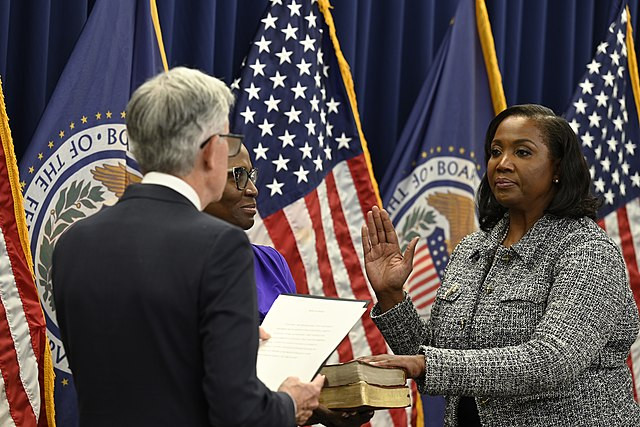President Donald Trump said he is firing Federal Reserve Governor Lisa Cook, an unprecedented move that could trigger a constitutional fight over the independence of the U.S. central bank and a president's authority to remove its officials.
In a letter posted to Truth Social late Monday, Trump told Cook he had "sufficient cause to remove you from your position" over allegations she misrepresented her residency on mortgage applications prior to her appointment to the Fed board. "At a minimum, the conduct at issue exhibits the sort of negligence in financial transactions that calls into question your competence and trustworthiness as a financial regulator," Trump wrote. He accused Cook of "deceitful and criminal conduct in a financial matter" and said he was invoking authority under Article II of the Constitution and the Federal Reserve Act of 1913.
Cook, appointed in 2022 by former President Joe Biden and the first Black woman to serve on the Fed's board, rejected the dismissal. "No causes exist under the law, and he has no authority," Cook said in a statement released through her attorney, Abbe Lowell. "I will continue to carry out my duties to help the American economy." Lowell added, "We will take whatever actions are needed to prevent this attempted illegal action."
The dispute stems from mortgages Cook obtained in 2021 on properties in Michigan and Georgia, in which she reportedly listed both as primary residences. Questions were raised by Federal Housing Finance Agency director William Pulte, who referred the matter to Attorney General Pamela Bondi. Legal scholars note the transactions were public at the time of Cook's Senate confirmation. "These officials have been vetted by our President and our Senate," said Peter Conti-Brown, a Fed historian at the University of Pennsylvania. "So the idea that you can then reach back, turn the clock backward and say, you know, all these things that have happened before now constitute fireable offenses from your official position is to me incongruous with the entire concept of 'for cause' removal."
The White House move sent ripples through financial markets. At 6:15 a.m. Tuesday, futures tied to the Dow fell 0.14%, the S&P 500 slipped 0.08%, and the Nasdaq lost 0.06%. Bond yields also shifted: two-year Treasury yields dropped, reflecting expectations of a quicker rate cut, while 10-year yields rose on inflation concerns. Analysts said the mixed reaction suggested unease but not outright panic.
The Congressional Black Caucus condemned Trump's action. "In the 111-year history of the Federal Reserve, no president has ever attempted to remove a governor of the central bank until now," the group said in a statement. "This is a blatant effort to distract from his failure to lower costs for Americans and a transparent attempt to install a loyalist at the central bank who will carry out his agenda without question."
Trump's move could reshape the Fed's balance of power. With Governor Adriana Kugler resigning in August and Trump nominating Stephen Miran to fill her seat, Cook's removal would give the president his fourth appointee to the seven-member board. Michelle Bowman and Christopher Waller, both Trump appointees, have supported lower rates, and Miran, pending Senate confirmation, could join them. Chair Jerome Powell, whom Trump originally appointed in 2017, remains in place until 2026.
Cook has vowed not to step aside. she has "no intention of being bullied to step down," Cook said last week after Trump first demanded her resignation. Her legal team is preparing to challenge the move, which analysts say could test the limits of presidential power over the world's most influential central bank.
"The concern is the intent of the Trump administration: it's not to preserve Fed integrity, it's to install Trump's own people at the Fed," said Kyle Rodda, senior analyst at Capital.com. "It goes back to trust in institutions... It's another crack in the edifice of the United States and its investibility."






